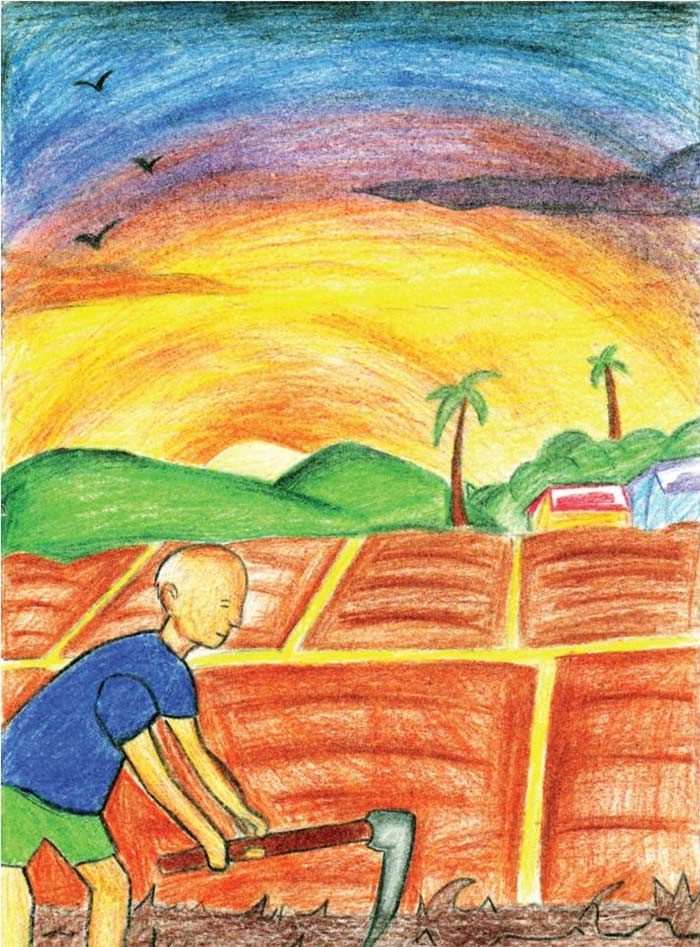The Farmer's Triumph

Samriddha Jung Adhikari
In a small, peaceful village nestled between rolling hills and wide fields, there lived a boy named Hari. He wasn’t the brightest or most talented child in his school. His friends could run faster, solve problems quicker, and often did things with ease that took Hari much longer to figure out. But if there was one thing that Hari was known for, it was his hard work.
Hari's family was poor, and they lived off a small patch of land where they grew crops. Every morning before school, Hari helped his father plow the fields, water the crops, and tend the livestock. While other children spent their evenings playing in the fields, Hari would return home after school to help his father on the farm. Life wasn’t easy, but Hari never complained. He knew that the only way to make something of himself was through hard work.
One day, the village head announced a big farming competition. The prize was a scholarship to the best school in the city , an opportunity of a lifetime for a poor boy like Hari. The contest was simple: whoever grew the biggest and healthiest crop within three months would win the scholarship.
Hari was determined to win. However, there was one major problem , he wasn’t naturally skilled in farming. His neighbor, Ramesh, was known throughout the village as a talented farmer. Ramesh’s fields always looked perfect, and his crops grew faster and healthier than anyone else’s. People would always say, "If anyone can win this, it's Ramesh."
But Hari wasn’t discouraged. One thing he thought he could not risk was talent, but he was very sure that the best approach was the effort. This he did day and night applying all the knowledge that he had gleaned from his father on the different seasons. But while the rest of them slept, Hari would get up early in the morning, inspect his fields and water and see that his crops were growing. Thus, he went on improving mistakes and seeking advice from farmers who had many years engaged in farming activities; he did all that he could do to ensure optimal growth of his plants.
Ramesh on the other hand, only depended on his inherent abilities. He had been preparing his seeds for planting with lots of confidence that like in the previous seasons his crops will grow. He did not put in as much effort as Hari did because he never felt like it , he had always relied on his ability. Ramesh chose to spend his time with his friends and laughed while watching Hari working hard on his fields all day proving that hard work could overcome talent.
Weeks went on, and then days, and the day when finally the crops were to be inspected arrived. Scores of villagers all thronged in the fields to watch the outcome of the exercise. Ramesh proudly stood next to his field thinking that the crops were going to be much better than the others’. Nevertheless, there was a problem and when the judges went to Hari’s field they were shocked. It was not just that his crops were bigger but-but they were also greener and more alive than anyone could dare to dream.
The judges declare Hari as the winner, Most of them walked away with prizes that are in proportion to the effort they put in. The village was shocked. How could Hari for instance who was not even talented win such a crucial competition and be a winner? The answer was simple: Hari had been working harder than anyone else. Unlike some of them who depended on their talents, Hari had to work each and every day for the result which was indeed rewarding.
The village head then passed on the scholarship to Hari as everyone in the compound clapped. Hari had made a point that it is not always about talent, but mere hard work will do the trick. This had nothing to do with which of you has the natural talent and everything to do with who is willing to work for it.
That evening, as Hari walked home he had so much pride. Not because he had won the scholarship but because he had been able to convince himself through the fact that persistence pays off. From that day onwards the people of the village enrolled their children and narrated them the story of Hari, the boy who taught them the moral of the story which is that hard work pays when talent doesn't work.
